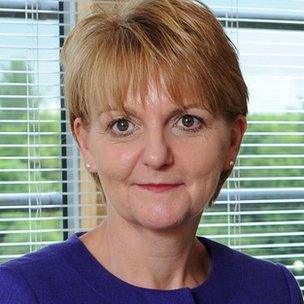Northern Ireland prison boss promises to tackle drug abuse
- Published

Prisons head Sue McAllister says drugs are not an inevitable part of prison life.
The new head of the Northern Ireland prison service has rejected claims that illegal drugs are an inevitable part of prison life.
Recent reports by the prisoner ombudsman has linked drugs to the deaths of two prisoners in Maghaberry and accused the prison authorities of tolerating the problem.
However, Sue McAllister, who has just taken over as director general of the prison service insisted this was not the case.
She said measures would be introduced to tackle the drugs problem.
Ms McAllister started her new job quietly at the start of this month and has spent the time since meeting prison staff and some of the prisoners held in Northern Ireland's three jails.
She is the first woman to hold the post of director general of the NI prison service.
The 51-year-old mother of two knows more than most about the problems and challenges it faces.
She was part of a review team appointed after the death of Colin Bell, who hanged himself in his cell in Maghaberry while on suicide watch in July 2008.
Deaths
In a highly critical report published three years ago, the team recommended the appointment of a new management team at Maghaberry and made 37 other recommendations for change.
It said the Prison Officers Association, the union that represents staff, was part of the problem.
Speaking to the BBC, Sue McAllister described the need to work with the association, in partnership with staff, to implement a radical programme of reforms.
In spite of that intimate knowledge of the problems facing the service she now leads, she came out of early retirement to take the job and is confident her 25 years of experience working in prisons in England and Wales has equipped her with the skill set needed.
Her career to date includes stints as governor of an adult prison for lifers and a young offenders' centre.
One of the big issues is the availability of illegal drugs inside prisons.
The problem was highlighted in two recent reports by the Prisoner Ombudsman Pauline McCabe, which linked the deaths of two prisoners at Maghaberry to the availability of illicit drugs as well as the abuse of prescription medication.
Priority
One of the prisoners, 21-year-old Aaron Hogg, hanged himself in his cell in May last year after taking a cocktail of drugs.
His solicitor told the BBC that Maghaberry was "awash" with drugs and said he regularly pleaded with judges not to send vulnerable clients to jail because of fears they would become addicted to drugs while behind bars.
Ms McCabe has accused the prison authorities of tolerating the drugs problem and accepting that it is an inevitable part of prison life.
Ms McAllister, who met the Ombudsman earlier this week, insists that is not the case.
"We are not complacent about the issue of drugs in prison, whether that be illegal drugs or the inappropriate use of prescription medicine," she said.
"We do not accept that drug use in prisons is inevitable and are working across a range of issues to stop drugs coming in and also reducing the demand for drugs, reducing instances of addiction and providing support for prisoners coming off drugs and staying off.
"The use of illegal drugs or the the unlawful use of prescription medication will not be tolerated. We will not be complacent about it and will continue to address the issue and it will remain a priority for us."
Ms McAllister is well aware that she will be judged on actions, not words. Having stated clearly that illegal drugs will not be tolerated in prisons, she has provided a yardstick against which her performance will be judged.
- Published28 June 2012
- Published13 June 2012